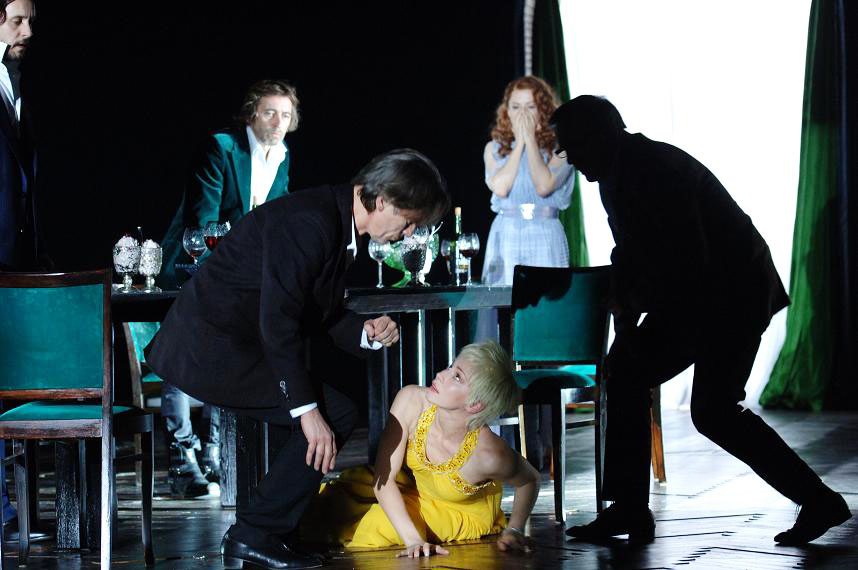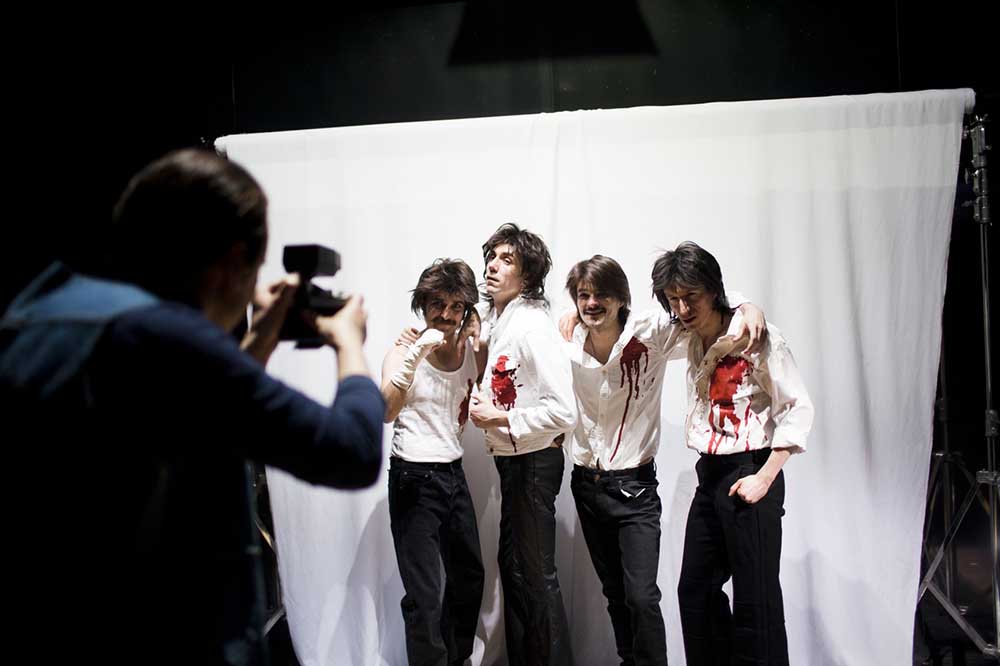Recently, the director has returned to Antiquity. As he said in an interview for 'Rzeczpospolita':
After 'Medea' at the Vienna Burghtheater, I felt unfulfilled, said the director, for me, the tragedies of the antiquity hold within themselves an unlimited range of themes that continue to resonate in our contemporary culture today. They contain, the archetypes of our attitudes and our behaviors, which have not changed over shifts in time, religion and civilizations. That’s why I don't want to leave antiquity. I want to explore it further.
In 2010, Jarzyna directed Areteira at the Schauspiel Essen (co-production with TR Warszawa; the piece was created as part of the Odyseja Europa (Europe Odyssey) taking place in the Ruhr region - 2010 European Capital of Culture). The performance was inspired by Homer's Odyssey and Stanisław Wyspiański's Powrót Odysa (Return of Odysseus), and explores Odysseus' relationship with his father and son. But foremost, it touches upon the religious aspect of an individual's life.
The theme of suffering and the inevitability of destiny are also conveyed by Jarzyna in his other brilliantly acted work based on Jean Racine's Phaedra prepared at the Amsterdam Toneelgroep (2010). The director's return to opera has also been marked as a success. At the Munich Beyerische Staatsoper, Jarzyna has prepared two single-act pieces: Maurice Ravel's The child and the Spells and Alexander Zemlinsky's The Dwarf (2011). Here, by playing with theatrical magic, he created a fairy-tale about the possibilities of the imagination. Jacek Marczyński wrote for 'Rzeczpospolita':
His production holds within itself the air of Shakespeare's A Midsummer Night's Dream and not unlike the character's of the Bard's own comedy, there is a call to the audience to submit to the magic. And maybe then they will become, just for a moment, someone else. Jarzyna is however not an idealist. He knows that dreams can end tragically, and that's what the second part represents. Also a fairy-tale, this time however, the subsequent experience is definitely more cruel.
International recognition
In 2011 Jarzyna directed a production of Nosferatu, a theatrical exploration of humanity's fascination with fear and transgression, the transcendence of norms and limits, taboos and the body itself. The show premiered at the National Theatre in Warsaw in November, 2011. It continued its run in 2012 on the TR Warszawa stage and also enjoyed showings at London's Barbican in the autumn of 2012, and an Australian premiere at the Adelaide Festival in 2013.
In April 2012, Jarzyna's staging of Festen travelled to St.Anne's Warehouse theatre in New York City, after eight years of persistent efforts on behalf of the theatre's director Susan Feldman. Chief NYT Theatre Critic Ben Brantley likens Jarzyna's directorial approach to that of Hitchcock and Kubrik writing that the director "builds up and stresses tension and intensity, brings scenes into crescendo and then makes them crash just before climax, how he contrasts mass scenes with portraits".
 A scene from Nosferatu, photo: Stefan Okołowicz / Teatr Narodowy
A scene from Nosferatu, photo: Stefan Okołowicz / Teatr Narodowy In the summer of 2012, Grzegorz Jarzyna's performance 2008: Macbeth opened the Edinburgh International Festival as the first Polish production to begin the event to date. In Jarzyna's vision, military commander Macbeth unleashes a nightmare of carnage and destruction. With spectacular pyrotechnics, immersive video effects and an extraordinary, layered soundscape that plays tricks on the ear, Shakespeare’s web of politics, ambition and the supernatural is transformed into a contemporary, and highly physical, theatrical film.
Jarzyna's movie theatre: Other Woman
Another of Grzegorz Jarzyna’s theatre productions which strongly refers to film is Other Woman, based on the screenplay to John Cassavetes’s Opening Night released in 1977. It is also the director’s commentary on the financial troubles of the Warsaw scene: 'The subject of the play stems precisely from what has been happening to me, to us, for the last year', said Grzegorz Jarzyna in an interview for Newsweek.
I was constantly talking a lot about this place. The theatre was thoroughly scrutinised by a number of financial commissions. There was a time when officials and inspectors relentlessly occupied the site. We felt as transparent as glass. I thought that this transparency of the theatre could become an artistic asset. It will allow us to look inside the theatre and behind the scenes.
 Druga kobieta directed by Grzegorz Jarzyna, photo: Kuba Dąbrowski
Druga kobieta directed by Grzegorz Jarzyna, photo: Kuba DąbrowskiThe creators of the Warsaw performance evoke the words of the Broadway actress played by Danuta Stenka: "Everyone wants to be loved. Everyone needs to be loved. The entire world. Everybody wants to be loved. When I was 18 years old, I could do anything. It was so easy. All my emotions were on the surface. Now it is getting harder and harder to communicate with people." In an interview with Gazeta Wyborcza Jarzyna comments:
Most people have encountered that proverbial wall, that point from which it seems that there is no way out. You build your career, you organize your life according to a comfortable scheme, while killing your genuine emotions. Victoria Gordon – the protagonist of our play - devoted her life to the theatre. She is a great actress for whom theatre is everything. She lives in a huge, empty apartment at a hotel. She consciously decided not to have family, children, husband in order to focus on what's most important to her, on what she is really good at. And it became a trap for her. She has devoted herself to these ovations, to that applause, to all those moments of happiness, a kind of mutual understanding with people in the audience who she does not know. She feels nothing – she repeats that many times. She doesn't feel her partner, love, kisses. She lost contact with other human beings. She wants to overcome that, she wants to break out of this.
The cast of the play includes Maria Maj, Agnieszka Podsiadlik, Danuta Stenka, Danuta Szaflarska/ Tomasz Tyndyk, Justyna Wasilewska, Jan Dravnel, Roman Gancarczyk, Rafał Maćkowiak, Dawid Ogrodnik, Lech Łotocki, Sebastian Pawlak, and Adam Woronowicz.
Martyrs
In 2015 Jarzyna staged Martyrs at TR Warszawa. The play was based on a drama by Marius von Mayenburg Märtyrer. In the times when people fear the Others who can ruin their values and believes, in the times when people fear radicals who want to control the lives of individuals and in the time when people fear economic crisis, Jarzyna's characters are turning towards the principles of faith that shortly become dogmatism. Jacek Wakar wrote in his review for Dziennik Gazeta Prawna Daily:
After watching Martyrs I am convinved that Jarzyna today has no use of any labels. It does not matter if anyone finds traces of a troublemaker he used to be, or on the contrary – calls him a modern classic, or defines him as conservative. Jarzyna follows his own path, more than ever resistant to external whispers or ideological attacks.
Witold Mrozek wrote:
Lidka from TR Warszawa has more of a mystic than of a crusade warrior. We watch her during her long and vivid prayers. Wasilewskia, one of the most interesting actresses of the young generation, with her subtle, but at the same time strong and intensive stage presence, looks like a saint on a gothic painting. Her role is much alike characters from Bruno Dumont's films. In his Hadewijch (2009), a girl from a cold, bourgeois family, is looking for God in a monastery, to finally join Islamic fighters.